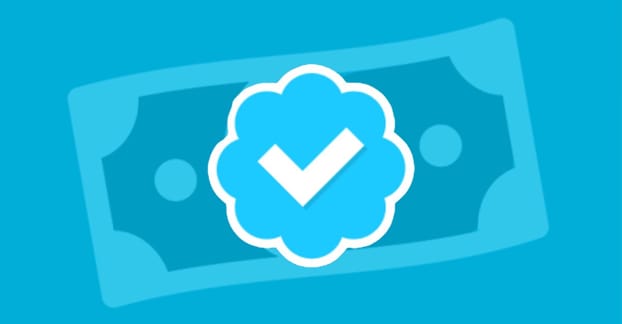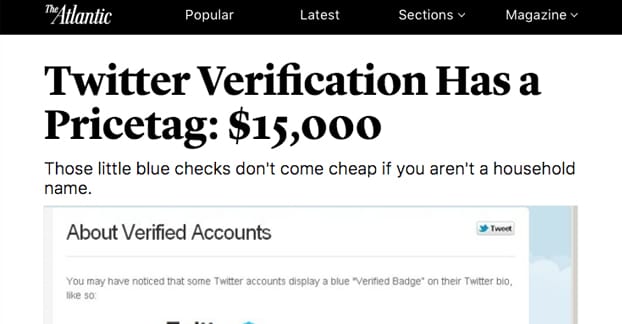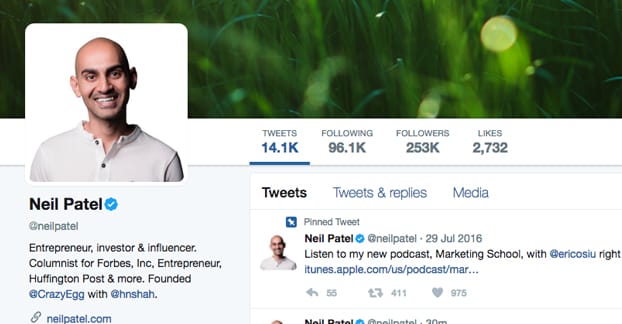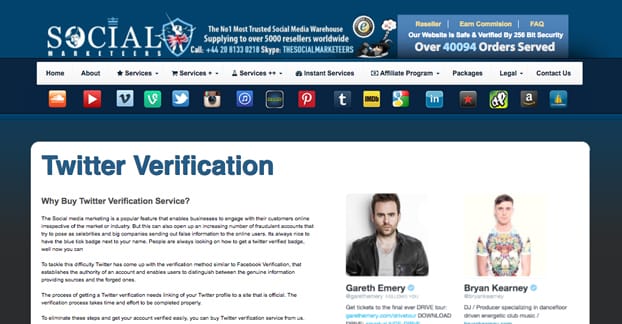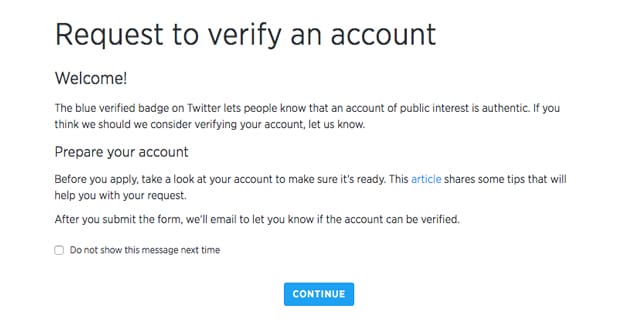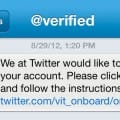Twitter verification is a tricky process, one that isn’t well documented, and one that different people have different experiences with. For my part, I’m not verified, and I’m low profile enough that I haven’t particularly sought it out. I have, however, done quite a bit of research on the topic for posts like this one, so you’re right in asking me about it.
So, the way I see it, there are four answers to the question of whether or not you can pay a company to help you get verified on Twitter.
Answer #1: Yes, Twitter
The first answer may seem like a joke, but I assure you that it really isn’t. While it may seem pithy to say you can bribe Twitter into giving you verification, you almost sort of can. Of course, there’s no “bribe Twitter officials” button, no “off the record contribution” you can file. No, we’re talking about paying Twitter the one way Twitter accepts money from anyone who happens by: advertising.
The idea is pretty simple. Twitter runs an advertising network on their social network, so anyone who wants to pay some money can get more exposure to their tweets. Since Twitter doesn’t need to pay publishers – the are themselves the publisher – any price they charge is money they make. The difference in rates across different audiences and different advertisements comes down to the competition for limited ad slots for those audiences. Regardless, every penny that Twitter charges for advertising is a penny they get in their coffers.
It stands to reason, then, that there might be some perks to spending more money on ads. Generally you would assume that any perks are along the lines of “more people reading your content” and “more people following your account” but there is some evidence to suggest that one of those perks is “increased chance of verification.”
The idea is that when you spend enough money, Twitter takes notice. They decide that they want to encourage you to keep using the platform, and they do this in a way that is to them quite free, but to you quite valuable: verification.
How much does it cost, then? Well, verification doesn’t come cheap. You might expect to have to be paying over $15,000 on advertising through Twitter… every month.
Granted, the article I’m referencing here is from five years ago, and it’s a data set made up of a single point, so there’s no way of knowing if it’s actually possible to buy your way into verification through basic Twitter advertising on a mass scale. However, if you’re the kind of company that has this much money to throw around, it’s entirely possible that you already have verification, or that being verified is already in the works, simply due to your size and high profile.
So, while you technically may be able to pay Twitter through ads and get verification out of the deal, it’s not a good idea, for a number of reasons.
- It’s not an official path to verification, and thus is not guaranteed to work.
- It’s extremely expensive, and thus out of the reach of most of the people and brands looking for alternative verification methods.
- There are easier, cheaper, and safer ways to go about getting verified on Twitter.
So that’s the first answer. What’s next on the list?
Answer #2: Yes, PR Firms
In order to understand how you might pay for verification, you need to understand how verification works in the first place. The core goal of verification is to give an added level of authority to people who have proven themselves to be of value. It’s used for companies to tell users that it is in fact the real company account, and not an offshoot account or an account made by someone else as an imposter or a scam. Impersonation on Twitter was a real problem for a while, and can still be a problem in certain circumstances.
Verification is also used to lend authority to certain people. Sports stars, politicians, journalists, and other people of note are given verification so that the average user recognizes that they aren’t just some random person. It avoids cases where a user might call out someone for “who are you and why should I believe what you say?” Well, the check right there says they’re somebody, even if it doesn’t say who they are.
Verification does not guarantee that the verified user is sharing valuable or even correct information. It doesn’t guarantee that they’re even moderately intelligent. All it guarantees is that they’re someone in a position of some power or authority, or at least that they are noteworthy in some way.
So how do you earn verification for yourself? Simple: become noteworthy.
If you’re going to pay someone to make you noteworthy, you have a few options. I list PR firms in the subtitle, and that’s one method. People who specialize in public relations and promotion can help you gain a bigger reputation, through a variety of different means. Likewise, many freelance marketers and social gurus are able to help you gain notoriety on Twitter, though it’s not guaranteed that they’ll do it in a way that’s efficient. You can pay individuals, small businesses, and large PR firms, and all of them can probably do a decent job at getting you more exposure around the internet and throughout your industry.
How will they do it? Well, that’s the question, isn’t it? It really depends on who you hire and how much you’re paying them. Some of them will use connections to get you links and guest posts, mentions and citations on large sites. Some will set up guest post campaigns. Some will buy or earn backlinks from all manner of sites. Some will simply spam backlinks from their own private blog networks for the SEO boost.
Different firms and different freelancers have different plans. I highly recommend learning what it takes to do the work yourself, even if you don’t actually plan on doing the work, for one simple reason: you know what you’re talking about. This way, when you find a company you’re thinking about hiring, you can sit down and have a chat with them about how they plan to get your brand from point A to point B.
If the company talks about building a good solid SEO foundation, auditing your site, optimizing your content stream, building a social media presence on several sites, running effective targeted ads, and other such items, you’re probably on the right track. However, that’s all stuff you can do on your own.
If the company talks about leveraging industry connections, getting magazine publishers to mention you, hooking you up with press releases and news coverage, and other sorts of media, it can be valuable. These are avenues that are much harder for a traditional web marketer to leverage, so a company that brings their connections and expertise to the table is able to help out a lot on that front.
If the company talks about “leveraging synergies” or “proprietary tactics” or “internal networks” or otherwise simply won’t disclose what methods they’re using, you should probably avoid doing business with them. Every aspect of growing a business online today is public knowledge. Some people have little tricks and connections they would like to hide to keep them from being exploited, but for the most part their techniques will be commonly known. If they’re not talking, they’re hiding something, which probably means they know what they’re doing is wrong and that telling you would cost them your business. Don’t hire them.
Answer #3: No, Scams
While the above answer is true in a technical sense, it’s also one of those areas where most of the people you find when you search are probably scams.
Scammers love preying on people who want something, have no chance of getting it, and are gullible enough to believe promises of “working on it.” With verification, an incredibly obtuse and difficult to analyze process, there are going to be hundreds of them.
Scammers will often either hide their techniques entirely and use black hat growth techniques in order to grow your site in the short term, or they simply promise what they can’t deliver. Anyone who promises that they can get your account verified on any site, Twitter or Facebook or anywhere else, is lying to you. There are absolutely no guarantees for any verification process, and the only company that can actually make that decision is the one offering the check mark in the first place.
Scammers abound, and sometimes it’s difficult to tell whether or not they’re legit until it’s too late. This is why it’s generally better to go about it in a personal way, and just try to earn your verification on your own.
Answer #4: No, Do It Yourself
At the end of the day, anything someone tries to do to get you verified is something you can do yourself. Twitter has published the form you need to fill out in order to verify your account, which you can find here. They also have published some information about what you need to earn verification, though they don’t go so far as to produce an itemized list. Let’s see what we can find, eh?
- Verified accounts must have confirmed accurate information. This means a verified phone number, a verified email address associated with the company you represent, if any, an accurate birthday if you’re a personal account, and public tweets. Protecting your tweets removes you from contention.
- Accurate information. Your bio, profile photo, header photo, and website link must all be representative of you or the business you represent. Coke’s Twitter account can’t use a profile picture of some random dude, and they can’t link to some non-Coke website.
Additionally, Twitter will ask for identification information upon processing your verification request and moving to the next step. For individuals and personal accounts, if you prove yourself noteworthy enough to be considered for verification, you will have to submit a scan of your government ID, typically either a driver’s license or a passport. If you’re a business you will generally have to provide identification information about representing that business, though since there are so many different types of businesses out there, and different roles that a representative might fill, this information will vary from case to case.
As for your account itself, they also have some recommendations.
Your account name and username should be in some way representative of who you are or represent. If your name is Dave Tyler, you shouldn’t have your account set to say you’re Steven Bock, or TheGreatIllusion, or AnotherComputer. This can be acceptable if it’s just your username, with the display name as your real name. For example, the artist Halsey’s real name is Ashley, but her stage name is Halsey, so her username is @halsey. Additionally, her Twitter display name is just “h”, but it works because her username is representative of her stage name.
On top of all of this, you need to come up with reasoning why you’re a noteworthy entity in your industry and why you are deserving of verification. This is where having a high profile website, being attached to a high profile company, or otherwise having some level of prestige is essential. If the best you can say is “we have hundreds of customers and thousands of website visitors who want to know” you’re not likely to get it. On the other hand, if you can say “I have an average of 200,000 readers on my column on Forbes who would like to trust my account” you have a much higher chance.
To sum it all up: invest in SEO, invest in public outreach and link building, invest in growing your web presence and your presence off the web, and attempt verification when you’ve reached a level where it could potentially hurt people to trust an account they think is you but isn’t.
